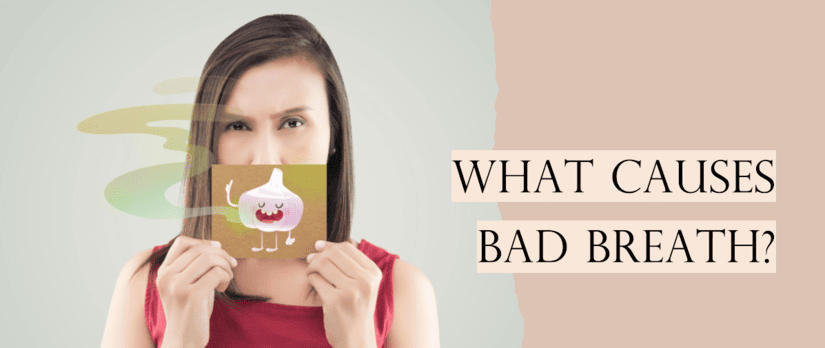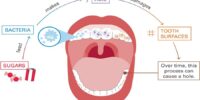What Causes Bad Breath?

Have you ever been embarrassed about your bad breath? It can be an uncomfortable and embarrassing experience when you realize that your breath is causing a stir.
Don’t worry, you’re not alone. It’s estimated that about a quarter of people suffer from bad breath, also known as halitosis, at some point in their lives.
In this article, we’ll discuss the causes of bad breath and how you can get rid of it for good.
How do I get my breath to stop smelling bad?
Having unpleasant breath can be embarrassing, so it’s important to take steps to get your breath smelling fresh again.
First, it’s important to identify the cause of the bad breath. Common causes include eating certain foods, smoking, poor dental hygiene, and malfunctioning of the salivary glands. Once you’ve determined the cause, you can take steps to address the issue.
If the cause is food-related, make sure to brush your teeth after every meal and floss regularly.
Smoking cessation is an absolute must for those who smoke.
Good dental hygiene, which includes daily brushing and flossing, tongue scraping, and regular visits to the dentist, should be practiced.
If the issue is related to salivary glands, drinking plenty of water throughout the day can help keep your mouth hydrated. Additionally, sugar-free gum or mints can help to keep your breath smelling fresh.
What are the main causes of bad breath?
Poor oral hygiene is a frequent contributor to unpleasant odors emanating from the mouth. Bacteria, which feed off of food particles left in the mouth, can be the primary cause of bad breath. Poor dental hygiene, such as not brushing or flossing regularly, can lead to a buildup of bacteria in the mouth.
Other causes of bad breath can include smoking, eating certain foods like onions and garlic, dry mouth, and certain medications. Poor nutrition can also lead to bad breath, as can medical conditions such as sinus infections, tonsillitis, and acid reflux.
Bad breath can often be prevented by brushing and flossing twice a day, using a tongue scraper, and drinking plenty of water. Mouthwashes can also help to remove bacteria from the mouth and freshen breath. Additionally, reducing the intake of foods that cause bad breath, such as garlic and onions, can help reduce its occurrence.
Visiting the dentist regularly can also help to identify any underlying conditions that may be causing bad breath. Taking the appropriate steps can help to ensure that bad breath is kept to a minimum.
Is bad breath a serious problem?
Though it may not seem like it, bad breath can be a very serious issue. It can be an indicator of an underlying health condition or poor hygiene. In some cases, bad breath can be a sign of more serious medical conditions such as diabetes, acid reflux, asthma, chronic sinus infections, or kidney or liver disease.
Additionally, bad breath can be caused by poor dental hygiene, such as an accumulation of plaque and bacteria in the mouth. If left untreated, this can lead to gum disease or tooth decay. In extreme cases, bad breath can lead to social anxiety and low self-esteem.
It’s important to take bad breath seriously and consult a medical professional for diagnosis and treatment options.
Does everyone’s breath have a smell?
You may not realize it, but everyone’s breath has its own unique smell. It’s not always detectable, but there’s always some sort of smell that’s released when a person exhales.
This smell can range from completely neutral to incredibly off-putting. It’s important to recognize that everyone’s breath has a smell, and that it’s not always a bad thing.
The smell of a person’s breath can be affected by various factors, including their diet, oral hygiene habits, and the presence of certain medical conditions. Eating certain foods can cause bad breath, as can poor oral hygiene or health issues, such as dry mouth or gum disease.
It’s important for everyone to be aware of the potential causes of bad breath, and to take steps to ensure that their breath stays fresh.
Why does my breath stink even after brushing my teeth?
Brushing your teeth isn’t always enough to keep your breath fresh; there could be other underlying factors that need to be addressed. Poor oral hygiene, such as not brushing or flossing your teeth regularly, can lead to bad breath.
In addition, certain foods such as garlic and onions can cause your breath to smell bad. Smoking or using chewing tobacco can also make your breath smell bad. In some cases, bad breath can be a sign of a more serious underlying medical condition, such as gum disease, diabetes, or respiratory tract infections.
Here are some other potential causes of bad breath:
- Dry mouth
- Consuming sugary foods and beverages
- Acid reflux
- Bacterial growth in the mouth
- Sinus infection
- Certain medications
- Smoking or chewing tobacco
Can bad breath cured?
Often, bad breath can be treated or prevented with good oral hygiene habits and lifestyle changes. Regular brushing and flossing, as well as tongue scraping, can help remove food particles and bacteria that cause bad breath. Additionally, drinking plenty of water and avoiding dry mouth can help reduce bad breath.
In some cases, bad breath can be caused by underlying medical conditions, such as tonsil stones, acid reflux, or diabetes. If bad breath persists even after making lifestyle changes and practicing good oral hygiene habits, it may be necessary to consult with a doctor to determine the underlying cause.
Depending on the cause, bad breath can be treated with medication, mouthwash, or other treatments. Ultimately, the treatment for bad breath will depend on the underlying cause, so it’s important to consult a doctor to determine the best course of action.
Can stress cause bad breath?
Stress can sometimes be a factor in the unpleasant smell coming from your mouth, so it’s important to find ways to manage your stress in order to help keep your breath smelling fresh.
When you’re feeling overwhelmed and anxious, your body goes into fight or flight mode. This can lead to a decrease in saliva production, which can make your mouth dry and cause bad breath.
Additionally, stress can also lead to poor oral hygiene habits such as teeth grinding or even forgetting to brush your teeth. All of these factors can combine to create a bad breath problem.
Fortunately, there are things you can do to reduce stress in your life and help keep your breath smelling fresh. Exercise, meditation, and talking to a therapist are all great ways to manage stress and reduce its effects.
Additionally, make sure to keep up with regular oral hygiene habits such as brushing and flossing your teeth twice a day and using mouthwash regularly. With these simple steps, you’ll be well on your way to keeping your breath smelling fresh.
Can you smell breath when kissing?
It’s possible that stress can indirectly lead to bad breath, but that’s not the only cause. Another factor that might be causing bad breath is what you’re doing right before a kiss.
Believe it or not, kissing can also be a source of bad breath. The truth is, you can actually smell breath when you’re engaging in a passionate kiss. The warm and humid environment created by two people kissing greatly intensifies and amplifies the smell.
So, if you’re having a bit of bad breath, it’s likely that your partner will be able to detect it. That’s why it’s important to take proper care of your oral hygiene before engaging in a kiss.
Does gum help bad breath?
Chewing gum can be an easy way to freshen your mouth and make your kisses even more enjoyable! Here are three ways gum can help with bad breath:
- Chewing gum stimulates the production of saliva, which helps to remove bacteria from the mouth.
- The act of chewing gum can help to mask odors caused by bad breath.
- Gum can also help freshen the breath by releasing certain flavor molecules that can help to mask bad smells.
Overall, chewing gum can help to reduce bad breath temporarily, making it a great tool to have in your pocket when you need it most!
How to have good breath?
Having good breath is essential for making a great first impression, so it’s important to take steps to ensure your breath is always fresh.
Brushing your teeth at least twice daily and flossing regularly are essential for removing bacteria and food particles from your teeth and gums. Additionally, it’s important to use an antibacterial mouthwash to help kill bacteria and a tongue scraper to remove the bacteria that accumulates on the back of the tongue.
It’s also important to maintain a healthy diet that is low in sugar and high in fiber, as sugar can feed the bacteria in your mouth and cause bad breath. Additionally, drinking plenty of water can help rinse away food particles and bacteria, while avoiding certain foods like garlic and onions can help reduce bad breath.
Following these simple steps can help ensure your breath is always fresh and your first impression is a good one.
Conclusion
Bad breath doesn’t have to be a problem. By understanding its causes and taking steps to prevent it, you can have fresh breath all the time.
There are many ways to get rid of bad breath, like brushing your teeth, using mouthwash, and chewing gum. Stress can also be a factor, so try to manage it as best you can.
With these simple steps, you can keep your breath smelling great and have confidence when you speak, kiss, and smile. So don’t be embarrassed by bad breath, take control and start fresh!







